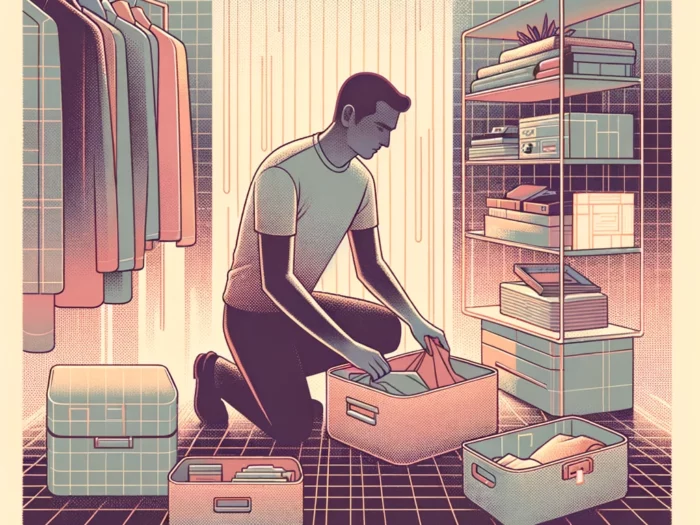Have you ever spent too much time thinking about something? When you put too much focus on your problems, life gets more stressful. Thinking too much, leads to a cluttered mind. Overthinking complicates life.
Overthinking is usually rooted in fear and uncertainty. How many times have you had any of the following thoughts?
- I wonder if they’ll like my presentation?
- How will I ever pay those bills?
- Does he/she really like me?
- What if I can’t get the project done on time?
- I can’t believe I just did that.
All of these thoughts and many others that you might obsess over are fear-based thoughts. Too much thinking doesn’t allow you to truly solve problems. It doesn’t give you the freedom you need to be positive and productive. It locks you into an anxiety mode and steals your happiness.
Why do I overthink so much?
The root of overthinking often resides in the quiet corners of insecurity, self-doubt, and fear. I remember a wintry evening from my adolescent years. As I sat on my bed, grappling with a mistake I had made earlier in the day, my mind became the stage for a riveting and regretful drama. In that moment, I was the impresario, choosing to play and replay the same scene in my mind continually, creating glaring marquees of my so-called ‘failures’. That’s when I realized something important – overthinking does not stem from the urgency to solve problems, but rather a propensity to dwell on them.
Overthinkers are, in essence, problem magnifiers. We build intricate labyrinths of ‘what ifs’ and ‘if onlys’, trapping ourselves in an endless loop of self-recrimination and worry, often about things we cannot control or change. It’s like trying to catch the horizon – a fruitless endeavor that only leaves us feeling restless, anxious, and overwhelmed.
However, overthinking is not a switch you can simply turn off. It’s a deeply ingrained habit, often nurtured over years, even decades. For some, it may even stem from past experiences or traumas, making it somewhat of a defense mechanism. The fear of making mistakes, of not being good enough, or of facing uncertainty can relentlessly drive us down the path of overcalculation and overanalysis.
In short, we overthink because we are human. It serves to an extent as a natural response to stress and uncertainty. But as with most things in life, moderation is key. When this habit becomes compulsive and starts interfering with our ability to make decisions, our productivity, or our overall well-being, that’s when it’s time to step in and say, “Enough is enough.” But don’t worry, you’re not fighting this battle alone. There are numerous strategies and measures that you – yes, you – can adopt to break the cycle of overthinking.
Overthinking Is A Form Of Clutter – Why Overthinking Is Bad
If you want a more simple life, stop thinking too much. Here are some ways overthinking complicates your life:
- It causes worry: When we overthink, we worry. Worry is not productive. Worry doesn’t solve problems. It only increases our stress. Stress complicates life.
- It’s a waste of time: Worry is a waste of time. We’ve all spent time worried about something insignificant only to wish we’d just let it go. Sometimes we lose hours, even days of quality time.
- It kills creativity: It’s true that creative solutions take some thought. My own experience has been that creative ideas usually come quickly. Overthinking will keep you stuck.
- It makes you overemotional: When we dwell on a problem or a situation, we often get frustrated, angry, or even hateful. Those negative emotions are physically and psychologically damaging. You might also tick other people off.
- It steals your energy: Overthinking causes worry and guilt. That drains your positive energy. You might find yourself dragging and feeling unmotivated. That can lead to depression.
How Can You Stop Overthinking?
Quitting overthinking is like changing a bad habit. You need to replace the negative thoughts with something else. Here are some simple ways to quit thinking too much:
- Be aware of your thoughts: Catching your negative thoughts and emotions is key. If you know when you’re overthinking, you can work on change.
- Think of what’s right and good: When we dwell on the bad, nothing good comes of it. Try thinking about what’s right with your situation rather than what’s wrong with it.
- Don’t expect perfection: If you’re a perfectionist, get over it. No one is perfect. I found that once I gave up perfectionism, I was able to get much more done with much less frustration.
- Let go of FEAR: Stop imaging the worse. FEAR is simply False Expectations Appearing Real. When you let go of those false expectation you’ll be able to move forward.
- Be grateful for what you have: It could be worse. There are thousands of people in much worse situations than you. Be thankful for the positive things in your life. When you’re thankful, it’s hard to be worried.
Breaking the Cycle: More Strategies to Stop Overthinking
Ending the whirlwind that overthinking often triggers entails more than just changing your thought patterns. It’s akin to untangling a knot of jumbled strings, where each string represents a different aspect of your mind. From habits to emotions to physical sensations, pulling one string often makes the others more entangled. Consider the following strategies to rid yourself of this mental clutter.
Practice Mindfulness
As a self-confessed overthinker, I can say that one of my most significant discoveries was the power of mindfulness. Maybe you too scoffed at this concept, inequality comparing it to the fads floating around on social media, innocently dressed in thewell cloak of ‘ness.’ But it’s an old practice with roots as deep as some of the oldest civilizations, akin to a well-aged wine – gathering depth, strength, and nuances over the years.
Practicing mindfulness is like savoring that wine – you dwell in the present moment, disregarding the ‘what ifs’ and brushing aside the ‘remember whens.’ You take note of the rich flavors of conversations, the warm undertones of a loved one’s smile, or even the slight bitterness after a disappointment. It quiets the relentless chatter of the mind, allowing you to focus on the here and now. Do it a little each day, and soon it will become integral to your routine, like brushing your teeth or checking your phone first thing in the morning.
Physical Exercise
Remember our jumbled strings analogy? Physical sensations are one such string whose impact on the mental clutter of overthinking is often underestimated. Much like shadows shrink under the glare of a bright light, anxieties quisling under the commanding presence of physical exhilaration. This isn’t merely me showing an affinity for fitness marred with poetic extravagance. A host of scientific research confirms the myriad physical and mental benefits of regular exercise.
Embrace the simple joy of movement. Let your laboring breaths drown out your uncertainties. Draw your attention to the rhythm of your heart, beating in your chest like the steady drumming of faith. It doesn’t have to be a marathon – a simple walk during lunch, an impromptu dance party in your living room, or a round of calming yoga can all be tools in your arsenal against the tyranny of overthinking.
Limit your decision-making time
I remember, once upon a time, how I used to spend inordinate amounts of time staring at restaurant menus, plagued with indecision. Will the pasta be too rich? Will I regret not ordering the steak later? It was a dance of uncertainty that saw my momentary happiness hostage to the perfect order. One day, I decided to limit my decision time. I gave myself a minute, promising to stick with whatever choice I made within that timeframe.
To my surprise, this simple trick worked wonders. Sure, there were times when I ended up envying my friend’s dish and certain others when I discovered a new favorite. But, most importantly, I freed myself from the stressful process of overthinking. Applying this on larger scales, like deciding on projects or planning trips, can significantly reduce your mental clutter. Remember, there is no ‘perfect’ choice, just a choice that feels right at the moment.
Of course these aren’t magical cures to be free from overthinking overnight,but rather stepping stones to guide you on your journey. Patience is key as you press ahead. Slowly but surely, you’ll start to see the difference.
Stop Overthinking And Start Living Today
Once you stop overthinking, you’ll find that life becomes less stressful. You’ll have more energy. You’ll be able to take positive steps to push forward through your problems.
If you enjoyed this post, I invite you to check out the Hip Diggs’ archives. Just click the link below:









